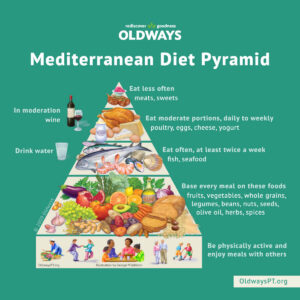Is the Mediterranean Diet healthy in spite of the wine, or partly because of the wine? A new study published in the European Heart Journal suggests the latter.
While most nutrition research relies on self-reported food and beverage intake from participants, this study features a scientific advancement in the field, as it uses urinary tartaric acid (a metabolite derived from wine) as a marker of wine intake among participants. In this study, 1,232 Spanish adults at risk of developing heart disease were followed see how wine consumption relates to heart disease risk using urinary tartaric acid as a biomarker. Compared with those who didn’t drink wine (as measured by <1 µg/mL of tartaric acid), those who lightly drank wine (as measured by 3–12 µg/mL of tartaric acid) or who drank up to 1 glass of wine per day (as measured by 12–35 µg/mL of tartaric acid) had a 38% and 50% lower risk of developing cardiovascular disease, respectively.

The University of Navarra’s Dr. Miguel Ángel Martínez González, one of the co-authors of this study and one of the co-authors of the groundbreaking PREDIMED trial, has previously suggested that “the Mediterranean diet loses up to 23.5% of its protective effect if wine is removed.” To better understand alcohol’s complicated relationship with health, Dr. Martínez-González has begun recruiting for the forthcoming UNATI study, which will also investigate wine’s role in the Mediterranean diet.
Despite nearly a century of strong and consistent research linking a Mediterranean diet (which contains low to moderate wine consumption with meals) with heart health, wine’s role in a healthy diet has more recently become a matter of scientific debate. The World Health Organization warns against alcohol consumption due to its classification as a Group 1 carcinogen and its role in increasing the risk of at least seven types of cancers. For this reason, many health professionals are uncomfortable with how to answer patient questions about red wine and health.
 The Mediterranean Diet Pyramid, which depicts low-to-moderate red wine intake alongside meals centered around an abundance of healthy foods like olive oil, vegetables, and nuts, is descriptive, not prescriptive, representing decades of scientific research and expert consensus on the building blocks of a Mediterranean diet. It would be inaccurate and misleading to brush wine under the rug and pretend like it was not a part of this healthy tradition, just because it presents a scientific quandary and makes some nutrition researchers uncomfortable. Given that heart disease is the number one killer in the US, alcohol’s potential beneficial relationship with cardiometabolic health should not be dismissed, and deserves further study.
The Mediterranean Diet Pyramid, which depicts low-to-moderate red wine intake alongside meals centered around an abundance of healthy foods like olive oil, vegetables, and nuts, is descriptive, not prescriptive, representing decades of scientific research and expert consensus on the building blocks of a Mediterranean diet. It would be inaccurate and misleading to brush wine under the rug and pretend like it was not a part of this healthy tradition, just because it presents a scientific quandary and makes some nutrition researchers uncomfortable. Given that heart disease is the number one killer in the US, alcohol’s potential beneficial relationship with cardiometabolic health should not be dismissed, and deserves further study.
In practice, the overall lifestyle that alcohol is a part of can reveal far greater information about health risks and benefits than simply analyzing alcohol in isolation. Low-to-moderate wine intake (with meals) is a characteristic component of a traditional Mediterranean diet, enjoyed in populations made famous for their longer lives and lower rates of chronic disease. When alcohol is consumed as part of a balanced meal, and coupled with daily movement and social connections, as in the Mediterranean, studies find a net health benefit. However, when alcohol intake is accompanied by unhealthy habits, like smoking or poor diet, or unsafe habits, like driving, obvious health risks present themselves.
There’s no reason to start taking up drinking if you don’t already, particularly if you have a family history of alcohol dependency. If occasional to moderate wine consumption with healthy meals is not a ritual that you are interested in abandoning, the Mediterranean diet presents an example of how to enjoy alcohol in moderation in a way that may support cardiometabolic health and help to foster positive social connections. And that is something that we can certainly raise a glass to!





Leave a comment